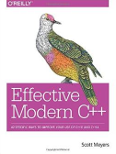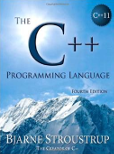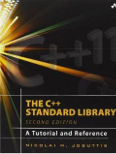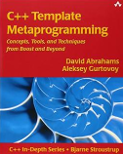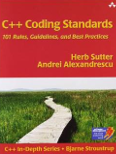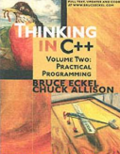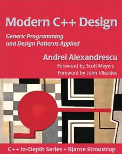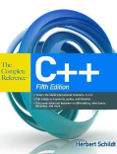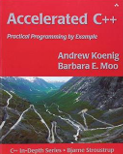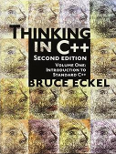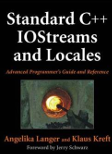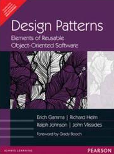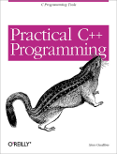|
|
| Line 5: |
Line 5: |
|
| |
|
| == C++ == | | == C++ == |
| | |
| | === Effective Modern C++: 42 Specific Ways to Improve Your Use of C++11 and C++14 === |
| | {| |
| | |[[Image:Effective_modern_c++.png|thumbnail|left]] |
| | | |
| | :* Author: Scott Meyers |
| | :* Published: December 2014 |
| | :* ISBN: 978-1491903995, 1491903996 |
| | :"Coming to grips with C++11 and C++14 is more than a matter of familiarizing yourself with the features they introduce (e.g., auto type declarations, move semantics, lambda expressions, and concurrency support). The challenge is learning to use those features effectively—so that your software is correct, efficient, maintainable, and portable. That’s where this practical book comes in. It describes how to write truly great software using C++11 and C++14—i.e. using modern C++." |
| | |} |
|
| |
|
| === The C++ Programming Language (4th Edition) === | | === The C++ Programming Language (4th Edition) === |
Revision as of 13:17, 27 June 2015
En
Ar
Bg
De
El
Es
Fa
Fi
Fr
Hi
Hu
It
Ja
Kn
Ko
Ms
Nl
Pl
Pt
Ru
Sq
Th
Tr
Uk
Zh
This is a compilation of books related to, but not specific to Qt, published in English. For books in other languages use the language switch. For Qt-specific books see Books.
C++
Effective Modern C++: 42 Specific Ways to Improve Your Use of C++11 and C++14
|
|
- Author: Scott Meyers
- Published: December 2014
- ISBN: 978-1491903995, 1491903996
- "Coming to grips with C++11 and C++14 is more than a matter of familiarizing yourself with the features they introduce (e.g., auto type declarations, move semantics, lambda expressions, and concurrency support). The challenge is learning to use those features effectively—so that your software is correct, efficient, maintainable, and portable. That’s where this practical book comes in. It describes how to write truly great software using C++11 and C++14—i.e. using modern C++."
|
The C++ Programming Language (4th Edition)
|
|
- Author: Bjarne Stroustrup
- Published: May 2013
- ISBN: 978-0321563842, 0321563840
- "The new C++11 standard allows programmers to express ideas more clearly, simply, and directly, and to write faster, more efficient code. Bjarne Stroustrup, the designer and original implementer of C++, has reorganized, extended, and completely rewritten his definitive reference and tutorial for programmers who want to use C++ most effectively. The C++ Programming Language, Fourth Edition, delivers meticulous, richly explained, and integrated coverage of the entire language-its facilities, abstraction mechanisms, standard libraries, and key design techniques."
|
The C++ Standard Library: A Tutorial and Reference (2nd Edition)
|
|
- Author: Nicolai M. Josuttis
- Published: March 2012
- ISBN: 978-0321623218, 0321623215
- "The Best-Selling C++ Resource Now Updated for C++11 The C++ standard library provides a set of common classes and interfaces that greatly extend the core C++ language. The library, however, is not self-explanatory. To make full use of its components-and to benefit from their power-you need a resource that does far more than list the classes and their functions. The C++ Standard Library: A Tutorial and Reference, Second Edition, describes this library as now incorporated into the new ANSI/ISO C++ language standard (C++11)."
|
C++ Template Metaprogramming: Concepts, Tools, and Techniques from Boost and Beyond
|
|
- Author: David Abrahams, Aleksey Gurtovoy
- Published: December 2004
- ISBN: 978-0321227256, 0321227255
- "With help from the excellent Boost Metaprogramming Library, David and Aleksey take TMP from the laboratory to the workplace with readable prose and practical examples, showing that "compile-time STL" is as able as its runtime counterpart. Serving as a tutorial as well as a handbook for experts, this is the book on C++ template metaprogramming." -Chuck Allison, Editor, The C++ Source C++ Template Metaprogramming sheds light on the most powerful idioms of today's C++, at long last delivering practical metaprogramming tools and techniques into the hands of the everyday programmer. A metaprogram is a program that generates or manipulates program code. Ever since generic programming was introduced to C++, programmers have discovered myriad "template tricks" for manipulating programs as they are compiled, effectively eliminating the barrier between program and metaprogram. While excitement among C++ experts about these capabilities has reached the community at large, their practical application remains out of reach for most programmers. This book explains what metaprogramming is and how it is best used."
|
C++ Coding Standards: 101 Rules, Guidelines and Best Practices
|
|
- Author: Herb Sutter, Andrei Alexandrescu
- Published: October 2004
- ISBN: 978-0321113580, 9780321113580
- "Consistent, high-quality coding standards improve software quality, reduce time-to-market, promote teamwork, eliminate time wasted on inconsequential matters, and simplify maintenance. Now, two of the world's most respected C++ experts distill the rich collective experience of the global C++ community into a set of coding standards that every developer and development team can understand and use as a basis for their own coding standards. The authors cover virtually every facet of C++ programming: design and coding style, functions, operators, class design, inheritance, construction/destruction, copying, assignment, namespaces, modules, templates, genericity, exceptions, STL containers and algorithms, and more."
|
Thinking in C++: Practical Programming, Volume Two
|
|
- Author: Bruce Eckel
- Published: January 2004
- ISBN: 978-0131225527, 0131225529
- "For sophomore/junior level courses in Advanced C++ Programming offered in Computer Science departments. This text fills the need for a practical C++ topics book beyond the introductory level. No other text covers the topics needed to prepare students for production C++ programming. It streamlines the process of learning the C++ language, presenting material a simple step at a time, which allows the reader to digest each concept before moving on, and provides them with a solid foundation in C++."
|
Modern C++ Design: Generic Programming and Design Patterns Applied
|
|
- Author: Andrei Alexandrescu
- Published: February 2001
- ISBN: 978-0201704310, 0201704315
- "In Modern C++ Design, Andrei Alexandrescu opens new vistas for C++ programmers. Displaying extraordinary creativity and virtuosity, Alexandrescu offers a cutting-edge approach to software design that unites design patterns, generic programming, and C++, enabling programmers to achieve expressive, flexible, and highly reusable code. The book introduces the concept of generic components, reusable design templates that enable an easier and more seamless transition from design to application code, generate code that better expresses the original design intention, and support the reuse of design structures with minimal recoding. The author then shows how to apply this approach to recurring, real-world issues that C++ programmers face in their day-to-day activity. All code is available on the Web, along with Alexandrescu's downloadable Loki C++ library, which provides powerful out-of-the-box functionality for virtually any C++ project. For experienced C++ programmers who have at least some familiarity with the Standard Template Library (STL)."
|
C++ The Complete Reference (5th Edition)
|
|
- Author: Herbert Schildt
- Published: December 2000
- ISBN: 978-0071634809, 0071634800
- "C++ The Complete Reference, Fifth Edition is a thoroughly revised new edition covering the new International Standard for C++, known as C++0x, which incorporates many new and exciting features. This comprehensive guide offers full coverage of C++, the premier language of high-performance systems software development, and includes in-depth details on all of the new features and functionalities of C++0x."
|
Accelerated C++: Practical Programming by Example
|
|
- Author: Andrew Koenig, Barbara Moo
- Published: August 2000
- ISBN: 978-0201703535, 020170353X
- "Want to learn how to program in C++ immediately? Want to start writing better, more powerful C++ programs today? Accelerated C++'s uniquely modern approach will help you learn faster and more fluently than you ever believed possible. Based on the authors' intensive summer C++ courses at Stanford University, Accelerated C++ covers virtually every concept that most professional C++ programmers will ever use -- but it turns the "traditional" C++ curriculum upside down, starting with the high-level C++ data structures and algorithms that let you write robust programs immediately. Once you're getting results, Accelerated C++ takes you "under the hood," introducing complex language features such as memory management in context, and explaining exactly how and when to use them. From start to finish, the book concentrates on solving problems, rather than learning language and library features for their own sake. The result: You'll be writing real-world programs in no time -- and outstanding code faster than you ever imagined."
|
Thinking in C++: Introduction to Standard C++, Volume One (2nd Edition)
|
|
- Author: Bruce Eckel
- Published: March 2000
- ISBN: 978-0139798092, 0139798099
- "In the first edition of Thinking in C++, Bruce Eckel synthesized years of C++ teaching and programming experience into a beautifully structured course in making the most of the language. It became an instant classic, winning the 1995 Software Development Jolt Cola Award for best book of the year. Now, Eckel has thoroughly rewritten Thinking in C++ to reflect the final ANSI/ISO C++ standard."
|
Standard C++ IOStreams and Locales: Advanced Programmer's Guide and Reference
|
|
- Author: Klaus Kreft, Angelika Langer
- Published: January 2000
- ISBN: 978-0201183955, 0201183951
- "IOStreams and Locales are two of the most important, eagerly-awaited components of the ISO/ANSI C++ standard -- and this is the first book to cover them exclusively, and in great depth. The authors explain the problems that IOStreams and Locales solve; then present a wide range of examples and techniques, from simple to sophisticated. The authors introduce concepts, component architecture, standards-compliant code, and practical patterns of use. "
|
Design Patterns - Elements of Reusable Object-Oriented Software
|
|
- Author: Erich Gamma
- Published: 2000
- ISBN: 978-7111211266, 8131700070
- "Design Patterns is based on the idea that there are only so many design problems in computer programming. This book identifies some common program-design problems--such as adapting the interface of one object to that of another object or notifying an object of a change in another object's state--and explains the best ways (not always the obvious ways) that the authors know to solve them."
|
Practical C++ Programming
|
|
- Author: Steve Oualline
- Published: August 1995
- ISBN: 978-1-56592-139-9, 1-56592-139-9
- "Fast becoming the standard language of commercial software development, C++ is an update of the C programming language, adding object-oriented features that are very helpful for today's larger graphical applications. Practical C++ Programming is a complete introduction to the C++ language for the beginning programmer, and also for C programmers transitioning to C++. Unlike most other C++ books, this book emphasizes a practical, real-world approach, including how to debug, how to make your code understandable to others, and how to understand other people's code."
|
- "Effective C", "More Effective C", "Effective STL" Scott Meyers (Amazon)
- "Exceptional C", "More Exceptional C" Herb Sutter (Amazon)
- "C++ Templates" Vandevoorde & Josuttis (Amazon)
Information Link: http://www.mindview.net/Books/TICPP/ThinkingInCPP2e.html
Download Link: http://www.mindviewinc.com/Books/downloads.html
- C++ How to Program by Deitel
